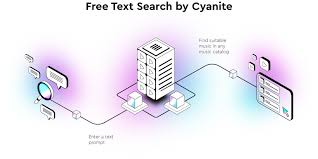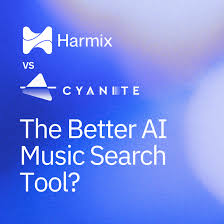In the fast-evolving world of music tech, artificial intelligence is no longer just a buzzword—it’s becoming an integral part of how professionals work. One of the most talked-about platforms in this space is Cyanite, a cutting-edge AI music intelligence system designed to make music searchable, understandable, and manageable like never before. If you’ve ever asked, “What is Cyanite music?”, you’re not alone.
Cyanite is helping labels, publishers, streaming services, and production houses gain powerful insights into their music catalogs using AI-driven tagging, emotion detection, similarity search, and more. This platform isn’t just helpful—it’s changing the way the industry approaches music metadata.
Whether you’re a music supervisor, sync agent, label manager, or an indie artist looking to organize your catalog, Cyanite offers real value. This guide breaks it all down in detail, so you can understand how Cyanite works, what it does, and why it's becoming essential in 2025.

What Is Cyanite Music?
Cyanite is an AI-powered music analysis and search platform that uses machine learning to automatically extract metadata from audio files. Its goal is simple but ambitious: make every song in the world searchable by emotion, genre, mood, key, BPM, and more—without human tagging.
Developed by a German startup founded in 2019, Cyanite has quickly gained traction among music professionals who manage large catalogs. From independent libraries to enterprise-level clients, users rely on Cyanite to automate music classification, simplify discovery, and accelerate creative workflows.
Cyanite vs. Harmix: Which AI Music Search Tool Is Better for Creators and Brands?
How Does Cyanite Work?
At the heart of Cyanite is a deep learning model trained on tens of thousands of professionally annotated songs. When you upload a track to the platform, it analyzes multiple layers of the audio in just seconds.
Here’s what Cyanite can detect:
Genre and Sub-Genre
Mood and Emotion (e.g., uplifting, melancholic, tense)
Instruments used in the composition
Tempo (BPM) and Key
Vocals vs. Instrumental
Energy level and dynamics
Lyrics themes and sentiment (in beta for some languages)
Once analyzed, this data is translated into tags and structured metadata that can be exported, searched, or integrated with other platforms via API.
Use Cases: Who Is Using Cyanite and Why?
The value of Cyanite music lies in how flexible it is for different types of professionals:
1. Music Libraries and Sync Agencies
Tagging thousands of songs manually is time-consuming and inconsistent. Cyanite helps automate this process so tracks are discoverable by mood, scene, or energy, making it easier to pitch music for ads, TV, or film.
2. Streaming Platforms
Cyanite allows platforms to build better recommendation systems based on audio features, not just user behavior.
3. Labels and Distributors
Organize massive back catalogs with uniform metadata, making it easier to monetize songs via sync placements or digital marketing.
4. Composers and Producers
Gain instant feedback on what kind of song you’ve created—perfect for tailoring your production to briefs or audience trends.
Cyanite vs Other AI Music Tagging Tools
Cyanite isn’t the only AI tagging tool out there, but it stands out for its depth and precision. Here’s how it compares:
| Feature | Cyanite | Musiio (by SoundCloud) | Aiva AI | AudioShake |
|---|---|---|---|---|
| Tagging Accuracy | High, multi-dimensional | Strong in genre/mood | Not focused on tagging | More for stem separation |
| Emotion Detection | Yes (complex emotional range) | Basic moods only | No | No |
| API Integration | Yes (real-time & batch) | Yes | Limited | No |
| Audio Similarity | Yes (find similar songs) | No | No | No |
| Metadata Export | Full JSON/XML export | Yes | No | No |
Real-World Success Stories
Cyanite is already being used by major industry players. Examples include:
Universal Music Publishing Group has integrated Cyanite’s tagging AI to manage and pitch its sync catalog more effectively.
Warner Chappell Production Music uses Cyanite’s search and emotion analysis tools to help clients find the right music for their projects.
Independent music platform Songtradr has experimented with Cyanite for music discovery and rights management.
The company has also partnered with audio tech firms to embed its API into music libraries, digital workstations, and playlist tools.
Why Cyanite Music Matters in 2025
We’re now in an era where volume and velocity of music production have exploded. With over 100,000 tracks being uploaded daily to streaming services, manual tagging simply can’t keep up.
Cyanite provides a scalable solution:
Speeds up metadata creation
Makes song discovery intuitive and efficient
Increases the commercial viability of music libraries
Enhances user experience on music platforms
In a competitive market, metadata is money. If your track isn’t findable, it won’t be licensed or streamed. Cyanite solves that with precision and speed.
Frequently Asked Questions (FAQ)
Q1: Is Cyanite free to use?
Cyanite offers a free trial, but it’s a subscription-based service for long-term use. Pricing depends on API usage and track volume.
Q2: Does Cyanite generate music?
No. Cyanite is focused on music intelligence, not generation. It analyzes and tags music—you still need to create it yourself.
Q3: Can Cyanite be used by indie artists?
Yes. While built for scale, Cyanite has affordable plans for smaller catalogs and single users.
Q4: What languages does Cyanite support for lyrics analysis?
Currently, it works best with English, but additional language support is in beta.
Q5: Does Cyanite integrate with DAWs?
Not directly, but it can be connected via API to platforms that DAWs support.
Conclusion: Is Cyanite the Future of Music Metadata?
Cyanite is more than a buzzworthy startup—it’s quickly becoming a backbone technology for how music is tagged, searched, and monetized in the digital age. With a powerful AI engine, real-time audio analysis, and flexible integration options, it’s built for the needs of 2025’s music professionals.
Whether you're managing a 10,000-track catalog or just trying to optimize your latest EP for sync licensing, Cyanite brings speed, accuracy, and insight to your music workflow. In a crowded and competitive music economy, that can make all the difference.
Learn more about AI MUSIC

